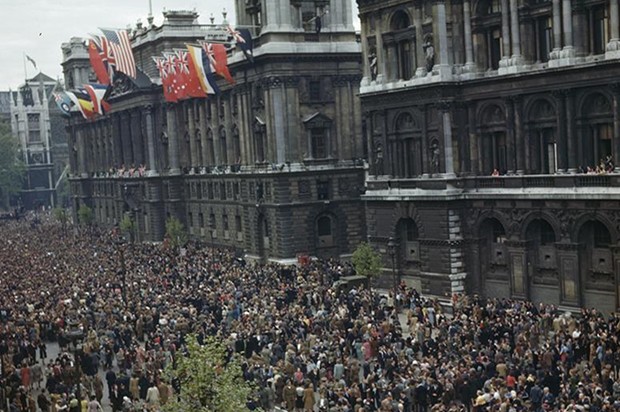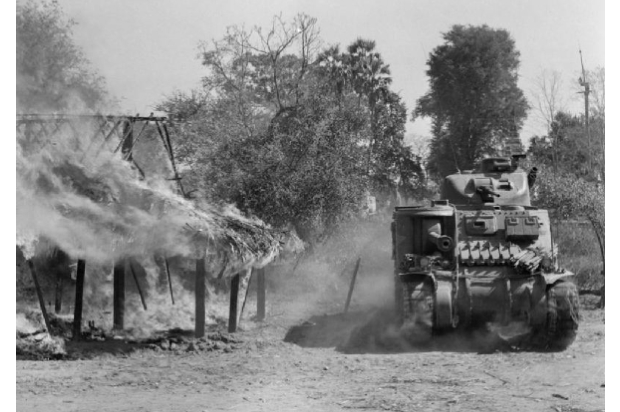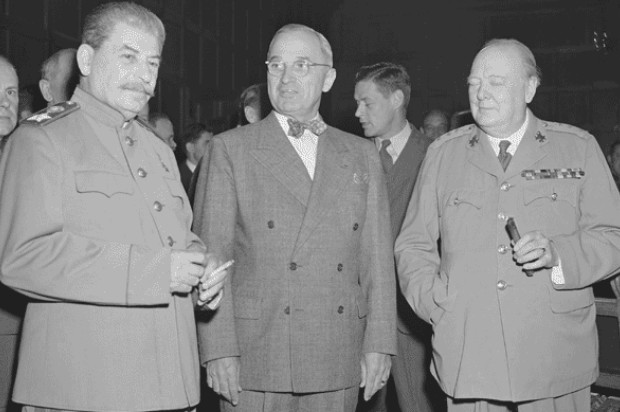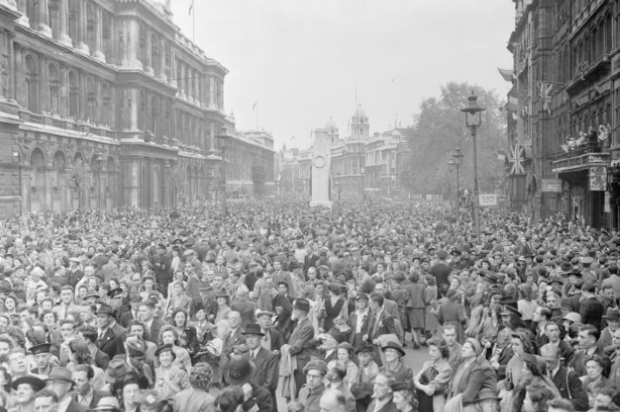‘The mission of this Allied force was fulfilled at 0241, local time, May 7th 1945.’[1]
Friday 8 May is a Bank Holiday in the UK to mark the 75th anniversary of VE Day.
Although many commemorative events have been cancelled because of coronavirus (COVID-19), the anniversary will still be marked by governments, in the media and in many people’s thoughts. The number of surviving veterans is diminishing, but family memories, the work of historians and cultural organisations, including museums (even if closed) perpetuate the significance of the day when war in Europe ended.

For the political and military leaders, armed forces and civilian populations of those countries who had been engaged in a long and deadly struggle against Nazi Germany and its allies, VE Day was indeed a cause for celebration. The ‘Big Three’ Allies: Truman (only 1 month into his Presidency), Churchill and Stalin could congratulate themselves on a major achievement. Yet they knew the situation on 8 May 1945 remained precarious and the future uncertain.
Fighting continued in many parts of the world. Millions had been forced from their homes, most national economies (save that of the US) had been devastated, and the occupation of most of central and eastern Europe by Soviet forces posed questions for the future. While commemorating a day of victory, it is worth remembering its wider context.
War in Asia
War continued against Japan, and some thought it could last another 2 years. No one yet knew whether the atomic bomb being developed at Los Alamos would work. British troops continued fighting in Burma until late August. In mainland China, the Nationalists who had borne the brunt of fighting the Japanese now risked losing the prize of overall authority to Mao Zedong’s Communists. Until Japan was defeated both the US and USSR would hedge their bets over who to support.
Japanese surrender came on 14 August, after the dropping of the bombs on Hiroshima and Nagasaki. The struggle for power in China continued until Communist victory in 1949.

Meanwhile, the need to feed and supply their dependent territories in the region would impose a huge burden on governments who could barely feed their own populations. This was a particular problem for Britain, bankrupt and exhausted.
Liberated Europe?
Though relief at the end of Nazi occupation was widespread, ‘Liberation’ meant different things across Europe.[2] Stalin knew very little about the traditions and realities of life in those areas of Central and Eastern Europe occupied by his forces[3]. He had already decided that the twin imperatives of security and economic reconstruction required Soviet domination or controlling influence in the countries on its borders (and further where possible). It was not a one-size-fits-all policy: at least in the immediate future, a compliant but not necessarily communist regime could be accepted in some countries, like Czechoslovakia. Deals could be done.
But the biggest problem was defeated Germany. Although decisions about postwar control had been taken at Teheran and Yalta, major differences between the occupying powers (Britain, France, the US and USSR) on the treatment of Germany and the allocation of its resources had already arisen by VE Day. They did agree, however, on the need to prosecute leading Nazis for war crimes, of which the liberation of concentration camps provided dreadful evidence.

(U.S. National Archives and Records Administration, via Wikimedia Commons)
Soviet interference was not the only problem for Liberated Europe. The return of governments-in-exile led to political tensions and clashes with Resistance movements who considered their efforts had earned inclusion in ruling regimes. The behaviour of wartime royalty was open to scrutiny. Soviet successes also strengthened communist parties throughout Europe, causing concern that some countries, like Belgium and the Netherlands, could descend into civil war like Greece.
Above all, for much of Europe, war had brought economic and physical devastation. The foundations of the postwar financial landscape had been laid in 1944 at Bretton Woods.[4] However, the extent of economic collapse meant that huge injections of cash, principally from the US, would be required within the next few years. On VE Day, the priority was to provide food, shelter and safety, and to tackle the major problem posed by refugees and displaced persons.
Building a new World Organisation
On 25 April 1945, the day that Soviet and US troops met at Torgau in Germany, the San Francisco Conference opened to establish the United Nations Organisation. Anthony Eden wondered whether it was worth attending when ‘Anglo-American relations with Russia are so completely lacking in confidence’.[5]
Yet though the precedent of the League of Nations, set up after the First World War, did not inspire confidence, most recognised the need for a forum where future disputes might be resolved. Recovery made a secure peace essential, and security meant a World Organisation.
Plans had already been laid at wartime conferences, foreshadowing later tensions and friction between the major powers, particularly the US and USSR, emerging as Superpowers from the war.
Behind all this lay the knowledge that the exploitation of atomic energy could produce a decisive, if terrible weapon. On VE Day, that knowledge was restricted in principle to a limited circle in the UK and US. In practice, Stalin had been kept informed on progress by Klaus Fuchs, working at Los Alamos, by Donald Maclean, in the British Embassy in Washington, and by Alger Hiss in the State Department. Guy Burgess, in the Foreign Office News Department, apparently passed to Moscow in May a Chiefs of Staff report on Operation Unthinkable, possible future war against the Soviet Union. In MI6, Kim Philby was in charge of the Soviet section. Against this backdrop, it is not surprising that VE Day, though a notable milestone, was by no means the end of the road.

Keep tabs on the past: sign up for our email alerts
Follow our Foreign & Commonwealth Historians on Twitter @FCOHistorians
[1] Message from Supreme Allied Commander in Europe Dwight D. Eisenhower to the Combined Chiefs of Staff, following the unconditional surrender on 7 May of German forces by General Alfred Jodl, German Chief of Staff. The surrender was ratified on 8 May by the head of the German Armed Forces, Field-Marshal Wilhelm Keitel.
[2] See Gill Bennett (ed), The End of the War in Europe (London: HMSO, 1995).
[3] Malcolm Mackintosh, ‘The Campaign on the Eastern Front 1944-45 and its Political Aftermath: a British Perspective’, in Bennett, op. cit.
[4] Conference held 1-22 July 1944 providing for the establishment of an International Monetary Fund and International Bank for Reconstruction and Development.
[5] Earl of Avon, The Eden Memoirs: The Reckoning (London: Cassell, 1965), p. 526.